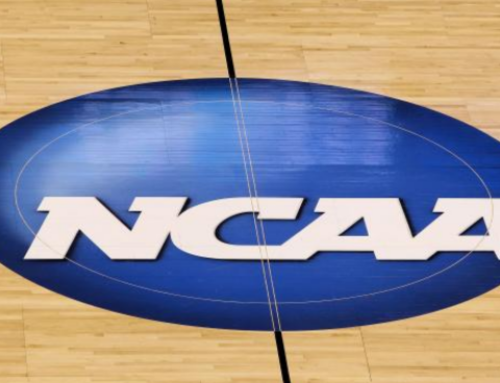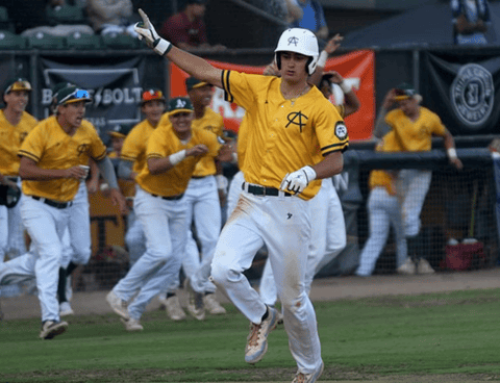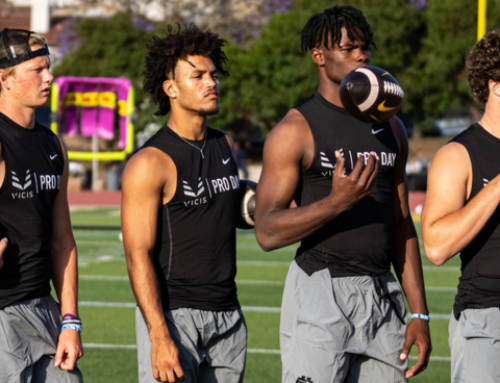NCAA rules for all-star games
By Sarah Gearhart
Participating in all-star games and other competitions might up your game skills. But if you aren’t aware of the following NCAA R&Rs, it could hurt your collegiate eligibility.
Prior to initial enrollment in a college
If you’ve already been accepted to a college and intend to enroll as a full-time student, you can participate in athletic competitions during your college’s official vacation period. While enrolled in college, you can compete in one high school alumni game per year. For sports other than basketball, the game must be played during your college’s official vacation period.
D-I athletes who play in more than two all-star football or basketball games following the completion of their high school eligibility will not be permitted to compete during their first year of collegiate athletics, unless however, the games are played between the time you graduate high school and before you begin your freshman year. Within that time, you can play in an unlimited number of all-star games.
Coach involvement
Any member of a college athletic department who is involved in the recruiting process may not coach all-star teams. Officiating games and managing players are also violations; however, the athletes’ eligibilities are not directly affected.
Use of college athletic equipment
Using a college’s athletic equipment for all-star games or other competitions is illegal. Violating this rule doesn’t affect your eligibility, but it is considered a violation against the college.
Payment based on performance
If you’re paid in any form—compensation, salary or gratuity—you lose your amateur status and become ineligible for any collegiate competition. The following are exceptions for D-I athletes:
• Prior to full-time college enrollment, prize money based on place finish in an open athletic event (not invite-only) may be accepted, but must be provided only by the event’s sponsor and cannot exceed actual or necessary expenses.
• You can participate on Olympic or national teams that are competing for prize money or will be compensated for their participation, but you cannot accept prize money or other compensation aside from actual and necessary expenses.
Exceptions for D-I, D-II and D-III:
• You may accept funds based on place finish from the Operation Gold Grant program through the United States Olympic Committee.
For more information about eligibility, check out www.ncaa.org.
RECOMMENDED FOR YOU
MOST POPULAR
NCAA rules for all-star games
By Sarah Gearhart
Participating in all-star games and other competitions might up your game skills. But if you aren’t aware of the following NCAA R&Rs, it could hurt your collegiate eligibility.
Prior to initial enrollment in a college
If you’ve already been accepted to a college and intend to enroll as a full-time student, you can participate in athletic competitions during your college’s official vacation period. While enrolled in college, you can compete in one high school alumni game per year. For sports other than basketball, the game must be played during your college’s official vacation period.
D-I athletes who play in more than two all-star football or basketball games following the completion of their high school eligibility will not be permitted to compete during their first year of collegiate athletics, unless however, the games are played between the time you graduate high school and before you begin your freshman year. Within that time, you can play in an unlimited number of all-star games.
Coach involvement
Any member of a college athletic department who is involved in the recruiting process may not coach all-star teams. Officiating games and managing players are also violations; however, the athletes’ eligibilities are not directly affected.
Use of college athletic equipment
Using a college’s athletic equipment for all-star games or other competitions is illegal. Violating this rule doesn’t affect your eligibility, but it is considered a violation against the college.
Payment based on performance
If you’re paid in any form—compensation, salary or gratuity—you lose your amateur status and become ineligible for any collegiate competition. The following are exceptions for D-I athletes:
• Prior to full-time college enrollment, prize money based on place finish in an open athletic event (not invite-only) may be accepted, but must be provided only by the event’s sponsor and cannot exceed actual or necessary expenses.
• You can participate on Olympic or national teams that are competing for prize money or will be compensated for their participation, but you cannot accept prize money or other compensation aside from actual and necessary expenses.
Exceptions for D-I, D-II and D-III:
• You may accept funds based on place finish from the Operation Gold Grant program through the United States Olympic Committee.
For more information about eligibility, check out www.ncaa.org.
RECOMMENDED FOR YOU
Create A Free Recruiting Profile Today!
CaptainU helps athletes & parents not only be proactive but also to manage and take control of their entire recruiting journey.










